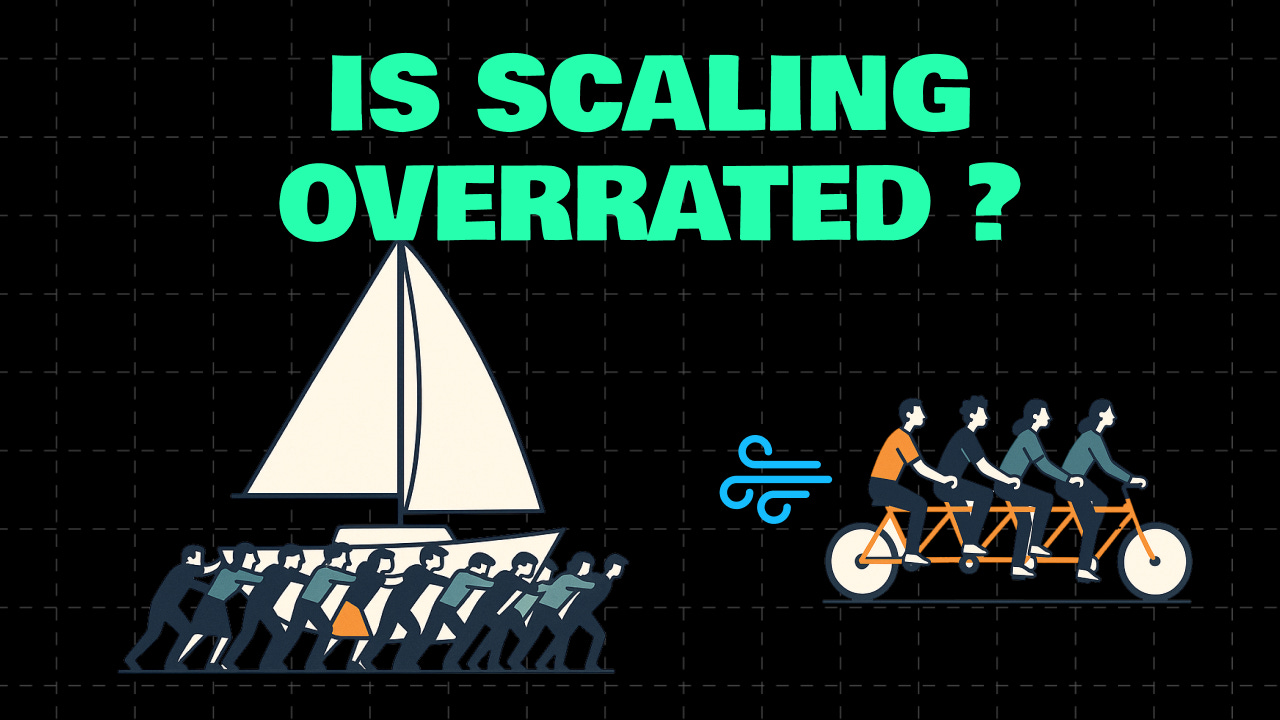The Slow Death of Medium-Sized Software Companies
What if scaling was no longer the goal? And what would that mean for software engineers?
Here's my prediction for the future : Medium-sized software companies are dying. And it won’t be because of market crashes, VC winter, or the next AI wave killing jobs (well, maybe a little).
They’ll die because, for the first time ever, they may become unnecessary.
When I say “software companies,” I mean exactly that: businesses built purely on software. No factories. No physical supply chain. No custom silicon or overseas production dependencies. You might still get an AWS bill that looks like a ransom note, but that’s about as “operational” as it gets.
Software is light. And in 2025, with all things serverless, cloud-native, and generous free tiers, it’s lighter than ever.
AI has dramatically reduced the cost of shipping features and building MVPs. But I think the really wild shift isn’t in cost — it’s in team size.
Medium-sized companies are in the worst spot. Startups are nimble. Giants have capital and reach. But the ones in the middle? Too big to stay scrappy, too small to compete on scale.
Let’s unpack that — and what it means for the future of software engineering if that prediction plays out.
Small teams, big power
Thanks to AI and improved automation, small teams are now playing in the big leagues. I actually know a few solo-preneurs and/or small teams landing enterprise clients.
Small teams aren’t just fast at building products. They’re close to their customers. They have ultra-tight feedback loops. They can tailor solutions with speed and precision — while larger orgs are still scheduling the kickoff meeting for the kickoff meeting.
Everyone who's worked at a fast-growing company knows that scaling is painful.
Hiring takes time. Onboarding takes longer. Context sharing gets messy. And suddenly, the scrappy startup that shipped a major feature every week is now bogged down in process, sync meetings, and permissions management.
If you've ever been frustrated at work just because of a missing permission or a ticket stuck in limbo… I feel you.
With fewer people, you ship faster. You stay closer to your users. You kill features (or even whole products) quickly without causing internal revolts. And you let AI fill in the gaps that used to require entire departments.
What if staying small is not only possible, but preferable?
A Better world for customers — and Engineers?
Now that we acknowledge the possibility of this shift, what happens when the market is full of these small-but-mighty teams?
From a customer’s perspective, it might feel like a golden age. More options. More competition. Faster updates. Closer support.
Yes, discovery could get overwhelming. But honestly, that's a solvable problem — and far better than the alternative of stale monopoly software. Think of how exciting the indie game scenes are compared to their corporate counterparts (if you are a gamer like me, you know). Software starts to feel alive again.
From a software engineer's perspective, it’s a little more nuanced.
If the trend holds, we’ll see more jobs — but in smaller companies. That means:
You’ll probably wear more hats. And that’s not a bad thing.
Job security in any one company could be lower — but you’ll gain experience faster, with more chances to work on different products throughout your career.
You'll be closer to the business, with a tighter feedback loop.
You’ll learn about infrastructure, product decisions, customer feedback loops, and maybe even business models. You’ll feel the impact of what you build for real users.
This feels like a great opportunity for continuous learning. Sure, it won't be your cozy corporate job, but the growth opportunity will be endless.
Generalists first
If small companies become the new default, software engineers will need to think more like product builders — or even founders.
As in any small startup, you won’t just be writing code. You’ll be choosing tools, managing infrastructure, talking to users, prioritizing features and yes, sometimes answering support emails.
That means generalist skills are going to matter more: full-stack engineering, rapid prototyping, even basic design and copywriting.
Playing devil's advocate — there will still be a need for deep specialists.
There are plenty of domains where depth still wins. If you’re working on database systems, fintech, or medical software, you’ll need real expertise. AI can help with boilerplate, but it can’t replace judgment or domain knowledge.
For example, if you’re building a new payment platform, knowing how settlements work, how fraud detection operates, or how different regulatory environments interact is not something ChatGPT can fully solve for you. Especially in R&D, fundamentals matter.
The difference is that specialists may increasingly become contracted or embedded, rather than hired into an in-house team. Small companies will bring in that deep knowledge when they need it, not assume they need a full-time expert for every vertical.
What should you do now?
If you're a software engineer today, this shift opens up real opportunities — but also calls for a mindset change.
First, embrace AI tools to increase your productivity. My key takeaway with AI is that you shouldn’t delegate the entire process. Even “vibe coding” requires domain knowledge. Keep learning the fundamentals and stay curious about how things work. The boring implementation code? Sure, let AI handle that.
Second, don’t fear small companies. You’ll probably learn more in 6 months at a 5-person startup than you will in 2 years at a large corporation. Learn to wear multiple hats.
Finally, the good news is : you can prototype all of this by yourself, as a solo-preneur. The best way to learn is to get your hands dirty. My own side project right now is subtldr (yes, a small plug — but hey, you're getting this content for free, so I figured it's fair).
Maybe I’m overly optimistic. Or maybe we’re finally entering a more sustainable, more human phase of software?
Who knows, but let’s talk again in 2030.


